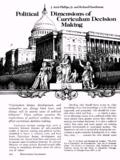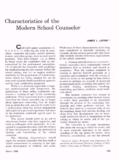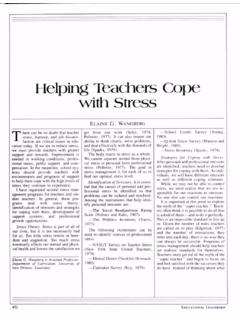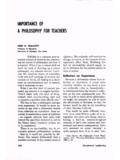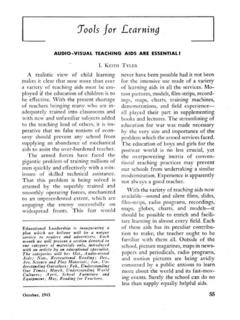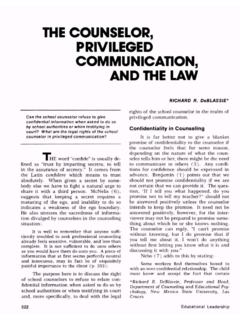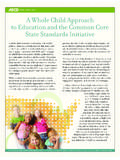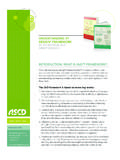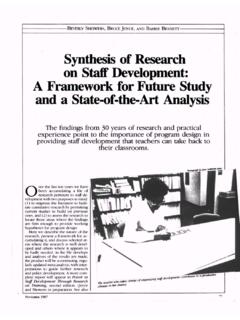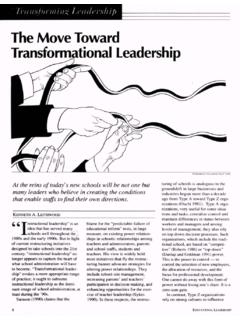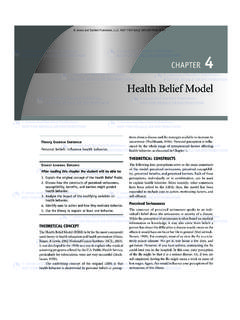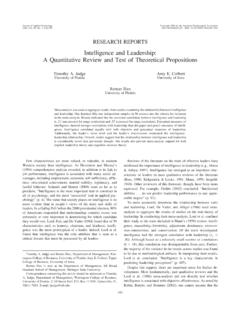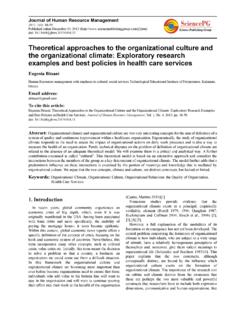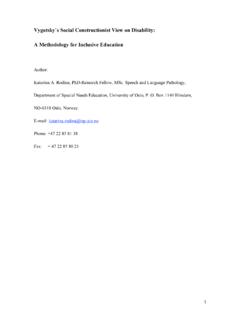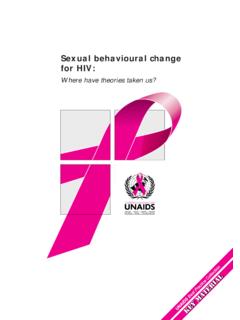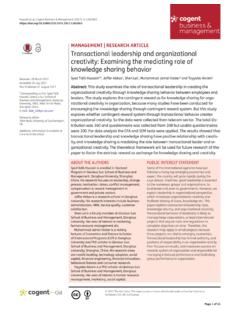Transcription of Toward a Curriculum Theory - ASCD
1 Q ~ =~=` =q ROBERT C. MORRIS* RUSSELL HAMM"A real value of curricular Theory lies not in the specificity of it, but in the questions it proliferates."MlUCH confusion exists as to what Curriculum Theory is. Part of this con fusion grows out of the all too common assumption among many educators that there is a Curriculum Theory . There is no one Curriculum Theory : there are a multi plicity of Curriculum theories some very explicit, some implied all of which have their addition, there is no one Curriculum Theory that is better than all of the others. A school district or a department of a school may have developed a Curriculum Theory which was reached through consensus, im position, or a variety of means, which seems to be right for them.
2 But this must be made clear: Curriculum Theory is laden with the normative. Even after a Curriculum Theory is asserted, the underlying assumptions are still there whether recognized or addition, Curriculum Theory is con fused with learning Theory and instructional Theory , even administrative Theory ; and ad mittedly, although these are not mutually exclusive theoretical categories, each has distinctive , then, are the major character istics of Curriculum Theory ? First, Curriculum Theory has an onto- logical bias; its ultimate concern is with the "what" or "why" of any educational enter prise. The primary concern is with neitherteaching nor learning but with knowledge itself, whether process or product knowledge .
3 Second, Curriculum Theory deals with alternative intellectual structures for orga nizing knowledge . In fact, each alternative structure assumes an answer to the question: What knowledge is of most worth? Third, Curriculum Theory moves to ward the universal and the abstract. Cur riculum Theory is macrocosmic, more or less, to the microcosmic Curriculum taught in each individual classroom. For example, a teacher who lets a textbook, a Curriculum guide, a unit plan, or a workbook determine the cur riculum in his or her classroom is substi tuting for a larger, more comprehensive Curriculum construct whether or not it is admitted or recognized. Curriculum Theory becomes a more viable concern of state de partments of education, school districts, cur riculum councils and a less viable concern as one moves to the practical and the opera tional.
4 This does not mean, however, that Theory becomes less important for the class room- teacher, but Curriculum Theory loses its distinctiveness where a teacher is forced by the immediacy of the situation to be con cerned with methodology, motivation, and content Theory can be further clari fied by briefly hitting some of the major curricular structures. These constructs can* R =`K=j I=r =c I=~ =o =e~ I=m = =b ~ X= =~ =f ~ ~=p ~ =r I=q =e~ January 1976299range from the classical to the contemporary. i ~ =p W=f n this Curriculum Theory , knowledge is systematically organized as a whole. Curriculum Theory is based on the specialized disciplines.
5 The best exam ples of this Curriculum Theory are archi tectonics and zetetics where the emphasis is placed on the logical structure, classification, and organization of knowledge . Curriculum Theory becomes a prerequisite to learning Theory , and instructional Theory becomes an implied result. The teacher transmits logi cally and the student learns. Architectonics has nine generic classes of knowledge with three categories of extension and three cate gories of intension. Zetetics has five zones and twelve sectors of knowledge .` ~ =p W=gean Piaget's de scriptive rationale of internal mental pro cesses is in essence a curricular Theory ; he was not directly concerned with prediction or with the methodology of teaching.
6 His orga nization structure of schema, assimilation, accommodation, equilibrium is simply a classical epistemology. Only by assumptions built upon assumptions can his conceptual structure be translated into instructional Theory . The real strength of his structure is its generative quality: it fosters hypothesiz ing. Learning Theory in Piaget's rationale is much like instructional Theory in the logical structure discussed earlier. It is the dark side of the moon. There is a genetically deter minant mode of conceptual development that operates throughout life and is unique to each individual.` =p W=gerome S. Brunei has no definitive curricular Theory except as it is assumed.
7 One is reminded of what Whitehead asked Dewey "Why don't you go ahead and build an ontology?" Bruner can no more build a Curriculum Theory that is definitive than could Dewey build a definitive ontology, yet Dewey conjectured an ontology of experiences. So Bruner's Curriculum Theory cannot develop simply out of a logical, a = tructure. Both logic and psychology are important. Curriculum Theory cannot stand alone: Curriculum Theory must be a part of learning Theory and instructionaltheory. As he wrote, "I think a Theory of development must be linked both to a Theory of knowledge and to a Theory of instruction, or be doomed to triviality." ' Does Bruner ac tually have a Curriculum Theory ?
8 Yes. What is it? It depends on a multiplicity of fac tors the situation, the human goals, the hypothesizing, and the testing. His curricu lum Theory has to be seen as intelligence operating in the real ~ =p W=^ ctivity analysis and job analysis popularized by Bobbitt, Morrison, and Charters during the 1920's and 30's is an example of using the scientific method, especially descriptive survey meth ods, to study the adult community to deter mine the Curriculum . This curricular Theory was based on the conservative assumption that the school should reflect the adult so ciety. Curriculum Theory then was specified by discovering through empirical data just what was necessary for an adult to know how to adjust well to the social ~ =p W=m aradoxically, to say that existential Theory implies no struc ture says empathically that there is a struc ture.
9 The point is that there is no institutionalized structure. Individuals ap propriate their own curricula. The existential structure is that individual meaning comes from individual appropriation. Each indi vidual will freely choose what myths he or she wishes to live curricular Theory constructs could be pointed to a biological structure or psy chological structure, an ethological-ecological structure; but the five examples here point Toward the distinctiveness of curricular real value of curricular Theory lies not in the specificity of it, but in the questions it proliferates. Curriculum Theory dealt with in isolation goes nowhere. Curriculum Theory leads to learning Theory which leads to in structional Theory which leads to Curriculum development which leads to the classroom which leads to Johnny Jones whom all this is about.
10 Q] Jerome S. Bruner. T ~ =~=q = =f = K=` ambridge, Massachusetts: The Belknap Press of Harvard University, 1966. p. Leadership Copyright 1976 by the Association for Supervision and Curriculum Development. All rights reserved.
